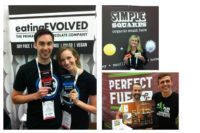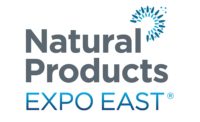So what’s “huuuge,” to borrow today’s political argot, in the healthy snack and confectionery categories?
How about new merchandising sets dedicated to roasted seaweed snacks, fresh snacking (refrigerated nutrition bars), and premium indulgent dairy (whole milk products)? How about grab-and-go marijuana-based munchies and cassava chips?
These are some of the finds I discovered while canvassing the 2016 Natural Products Expo East show, held in Baltimore Sept. 21-24. The new categories are indicative of American consumers who, this election year, are yearning for both change and healthier products.
Below are 10 products exhibited at Expo East that illustrate headlining healthy snack and confectionery products. Trust me, we’re breaking new ground here.
Natural Products Expo East is the largest organic and natural food and beverage event on the East Coast. According to organizers New Hope Natural Media, attendance grew by 10 percent to more than 28,000 participants.
The higher attendance rate is a reflection of the bullish market for healthy snack and confectionery products. “With a third of consumers saying they are snacking on healthier options more often this year compared to last year, there will be an increasing need for better-for-you snacks,” advises the Mintel Snacking Motivations and Attitudes 2015 report.
And when these consumers reach for a better-for-you snack to satisfy a need, it’s more than likely a premium or specialty food brand. In fact, according to a recent survey conducted by the Specialty Food Association and published as Today’s Specialty Food Consumer 2016 report, 60 percent of the respondents reported purchasing specialty or gourmet food within the past six months.
Of this group, Millennials (ages 22 - 39) were the predominant core consumer. Among specific consumer behavioral traits, they value specialty/premium foods that are convenient; embody social or environmental concerns; impress guests; or fit well for special occasions.
One of those environmental concerns is organic certification. Among buyers of organic products, an Organic Trade Association recent survey reveals that Millennial parents are the major consumer group.
How do these purchase drivers relate to my headliner list of stand-out new products?
Let’s start with hemp-based snacks. Marijuana munchies is a market without stamina, you say? Then consider this: Hershey’s old Canadian chocolate factory in Smith Falls, Ontario, Canada, has been converted into a medical marijuana factory, with its former sugar vats transformed into a hydroponic irrigation system capable of supporting a crop valued at $91.3 million. As more states legalize marijuana — currently there are 21 — look for more hemp-based snacks.
So, what’s up with cassava? Remember the TV ad featuring a hapless farmer and his somewhat wiser canine sidekick who were perpetually looking for their lost Idaho potato truck? Well, I have a hunch that it was hijacked by cassava growers. Cassava products were all the rage at Expo East. For example, Planet Snacks launched its Cassava Crunch line of chips. And another company, Natural Sins, is marketing itself as the “un-potato” chip.
Idaho potato growers’ pride aside, cassava is the top exported tuber/root in the world, according to the 2014 FAO Statistical Yearbook. In addition to being a major source of carbs and food staple for African and South American consumers, cassava has several significant health benefits, such as a source for minerals and B-complex vitamins.
But what’s resonating with today’s health food marketplace is cassava flour as a gluten-free baking substitute. “People were writing us to say they haven’t tasted this kind of product in 10 years; that their kid can finally eat a cake or cookies,” says John Olsen, senior executive of Otto’s Naturals, a leading supplier of cassava flour.
And what about whole milk? The USDA estimates that the conventional whole milk market grew 8.3 percent since last year, as compared with -4.1 percent for the total market. What’s driving these sales? Jim Carper, editor-in-chief of Dairy Foods, says that part of its appeal might be from research showing that “milk fat has some health benefits, unlike other animal fats.”
For John Fout, co-founder of Sohha Savory Yogurt, unsweetened whole milk yogurt, or what he calls Middle Eastern style, offers a refreshing tartness and creaminess, in contrast to the sugary dessert-style yogurts that fill the supermarket shelves. The ex-Wall Street trader turned Brooklyn yogurt maker flavors some of his yogurt with classic, savory Middle Eastern spices, like zatar and sumac, as an homage to his Lebanese-born wife. His booth at Expo East was particularly busy.
Plant Snacks
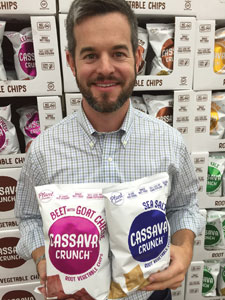
Eschewing the trend for chips made with ancient grains, corn, or rice, Plant Snacks launched Cassava Crunch, “root vegetable chips made from cassava,” at the Expo. Why cassava as a snack? “When baked in our proprietary process, it has a wonderful crunch; a nice snap to it and is a great carrier for the ingredients we put into it,” explains CEO Pete Lescoe. These chips are baked, not fried, contain 50 percent less fat than popcorn, and are gluten-free, grain-free, and non-GMO. They are available in five flavors: Beet & Goat Cheese, Cheddar, Seeds, Kale, and Sea Salt. Lescoe is an experienced entrepreneur, having founded Food Should Taste Good, a snack brand acquired by General Mills in 2012.
Plant Snacks - Beet & Goat Cheese, Cheddar, Seeds, Kale, and Sea Salt; 5.0 oz./142 gr; S.R.P. $3.99
Natural Sins
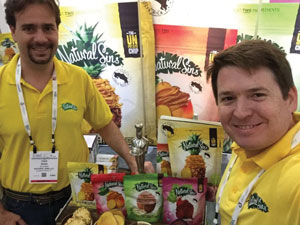
Marketing itself as the “un-potato chip,” Natural Sins’ chips are fruit or vegetables that are thinly sliced and baked. They contain only two ingredients — baked fruit or vegetable and a bit of raw cane sugar — and have a 14-month self-life. “Our product leverages all the ripeness of the fruit or vegetable and makes them available all the year round,” says co-founder Iván Sosa.
Its Crispy Coconut Chips was a 2016 SOFI finalist in the sweet snacks category. Each bag contains less than 100 calories, is high in dietary fiber, and has no sodium. They are excellent grab-and-go snacks and, according to Sosa, are very popular with women over 22 years old as well as moms buying them for their kids. The snacks provide mothers with a way of getting their children to eat veggies. Natural Sins sources its ingredients directly from Costa Rican farmers and its packaging proudly displays the Essential Costa Rica label.
Natural Sins – Crispy Coconut Chips, Crispy Beet Chips, Crispy Pineapple Chips, and Crispy Mango Chips, 1.0 oz./28 gr. S.R.P. $2.99.
SeaSnax
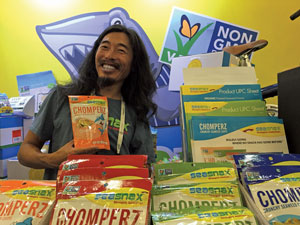
SeaSnax is the first company to take a product traditionally eaten with rice and position it as a stand-alone snack; hence, its name. “We didn’t invent seaweed, but we were the innovator to move seaweed into the snack category,” explains Ben Kim, self-described Chief Etc. Officer.
SeaSnax started in 2010 almost by accident. Jin Jun Kim, who is very health conscious, started roasting seaweed for her three-year-old daughter because everything on the market at the time used cheap GMO-based corn or canola oil and table salt. Seaweed is a traditional Asian side dish, but it is also eaten historically in Iceland and Ireland. In Korea, seaweed, called nori, is a very high-end delicacy traditionally gifted at holidays.
Jin Jun Kim started roasting her own seaweed using organic extra virgin olive oil, organic spices, and sea salt. Her intention was to sell it at the Los Angeles farmers market, but that waiting list was too long. So she took the product to a natural foods store across the street from her school. They immediately placed an order. Soon after, SeaSnax was in Whole Foods, and by the end of its first year, it was in 600 stores throughout the country.
By the following year, the new company was breaking even. In 2016, SeaSnax Lime was a SOFI finalist in the vegan or gluten-free products category.
When the company first started, its snacks were positioned in the Asian or macrobiotic aisle, but with growing consumer acceptance, it migrated to the salty snacks aisle. Lately, some trend-setting stores have created a whole new set specifically for roasted seaweed snacks. So, in five years, the category has hit $300 million in sales and is growing 10 percent to 15 percent per year, Kim estimates.
SeaSnax – Big Grab-and-go line: Original, Wasabi, Jalapeno, Barbeque, and Lime; 0.36 oz./ 10 gr; S.R.P. $1.89; Stix line: Wasabi, Almond, Sesame, and Original; 0.7 oz./20 gr; S.R.P. $3.99; Chomperz line: Onion, Jalapeno, Barbeque, and Original; 1.0 oz./30 gr; S.R.P. $3.99.
Perfect Bar
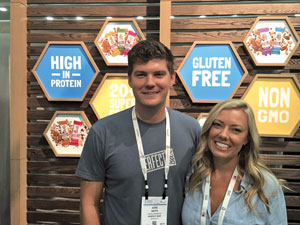
Roasted seaweed snacks isn’t the only new merchandising set I discovered at Expo East. “Fresh snacking” is another. Here’s the story:
Perfect Bar’s COO and Co-Founder Leigh Keith is one of 13 siblings whose father, Dr. Bud Keith, is touted as one of the earliest health food nuts and, notably, worked alongside fitness guru Jack LaLanne. It was LaLanne who, back in 1953, introduced weight fitness and whole food nutrition to the masses via an emerging new medium of TV and who fueled the passion for Dr. Keith’s nutrition principles. From his experience with LaLanne, Dr. Keith deemed whole food supplements, protein powders and omega-oils as an integral part of his family’s diet. “I grew up seeing first hand and understanding how whole food nutrition could nourish your body and help you live a healthy life,” Keith recalls.
“Dad” was constantly tinkering with recipes, always discovering new ways to feed his king-size family a healthy snack while on the go. One day, he ground up a bunch of dried fruits and vegetables, mixed them with freshly ground, organic peanut butter and honey, took one bite, and declared, “It’s perfect!” And, from there, the recipe was born.
In 2005, he became ill and his family had grown to 13 kids, all under the age of 23. Knowing they needed to way to provide for their family, the eldest siblings got together, gambled it all, and turned their father’s recipe into a business. And that’s how Perfect Bar came to be. As the first refrigerated nutrition bars on the market, Perfect Bars contain up to 17 grams of whole food protein, more than 20 superfoods, complex carbohydrates for energy and are non-GMO and gluten- and soy-free.
Fast forward to 2016, major retailers have come to recognize the uniqueness and nutritional benefits of Perfect Bar, and how it resonates with Millennials’ need for convenience and fresher options. The more enterprising retailers have created a set around the products, centered on fresh snacking, within the refrigerated aisle. In addition to Perfect Bars, the sets contain other refrigerated products, such as fresh-cut apples, yogurt, Homemade Harvey (squeezable fruit pouches) and Nomva (squeezable superfood and probiotic pouches).
So, how is the business doing? “We’re proud to have doubled our business, year over year consecutively, for the last 5 years. It’s incredibly exciting to watch our sibling startup of cold-pressed nutrition bars pave the way for a new, high-traffic destination in more than 6,000 stores nationwide.”
Perfect Bar – Blueberry Cashew, Maple Almond, and Coconut Peanut Butter; 2.3 oz./71 gr; S.R.P. $2.99.
HempsGood

If your association with hemp is only with hippies and hucksters, then it’s high time you got caught up. Let’s start with a quick history lesson, courtesy of hemp snack maker HempsGood.
In old timey days, ships’ sails, ropes and artists’ canvases were made from hemp, the non-medicinal cousin of marijuana. (Canvas is a corruption of old English, “canevase”, which came from the word cannabis.) It was such an important and versatile crop that early American settlers grew it, including many of our founding fathers. In colonial Virginia, a farmer could be jailed for refusing to grow hemp.
Benjamin Franklin used hemp paper for his printing press. The first drafts of the Declaration of Independence and Constitution were written on hemp paper. Additionally, hemp oil was used in making quality paints, varnishes, gasoline and even early plastic. All these important and wide-spread industrial uses were propelling hemp to becoming our country’s first billion dollar crop, predicted Popular Mechanics magazine back in 1938.
Then, according to the hempsters’ interpretation of history, the liquor industry, which was reemerging from prohibition, and the FBI conspired to outlaw hemp as a dangerous narcotic. Proof? Ever see the cult film, Reefer Madness?
That was then; this is now, and as recent Nobel Literature Prize winner Bob Dylan said, times, they are a-changing.
Ten years ago, Canada legalized industrial hemp farming, and soon our northern neighbor became the hemisphere’s biggest producer and the United States its biggest consumer. Hemp is becoming an important ingredient for the textile and cosmetic industries. As a snack food, hemp contains 12 amino acids, making it a complete protein, and a great source for omega oils and fiber.
In the United States, state-by-state hemp cultivation is making a comeback. Currently, 21 states have legalized hemp cultivation; and in some states, it has replaced tobacco growing as a cash crop.
HempsGood opened its doors a year ago to capitalize on the nutritional benefits of hemp. It just released a line of snacks, called Bhang, as a grab-and-go treat packaged in stick-pack pouches. Each pouch contains seven grams of protein, low sugar, and are vegan and gluten-free. As a point of differentiation from other hemp snacks, it contains some unshelled seeds for a crunch factor. (Products made exclusively from shelled seeds seem mushy when eaten.)
Three flavors are available: Southwest Barbeque, Sweet Cinnamon, and Thai Coconut & Lemongrass. This flavor selection was intended to appeal to the mass market, “plus something which is a little bit more unique and trending,” says David Kimmel, HempsGood’s product developer and partner. He also recommends Bhang as a great salad topper, breading on fish or chicken, scrambled into eggs, or sprinkled on ice cream, yogurt, or cottage cheese.
So, what would Milton Hershey think of this? Maybe that it’s time to jump on the magic bus and ride this trend.
HempsGood – Bhang Southwest Barbeque, Bhang Sweet Cinnamon, and Bhang Thai Coconut & Lemongrass; 0.7 oz./20 gr; S.R.P. $1.89.
Vegan Rob’s
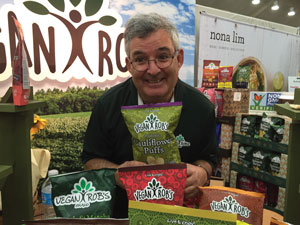
Vegan products were very much on display at Expo East. Rather than focusing on consumers following strict vegan diets, these companies are targeting flexitarians who increasingly consider vegan snacks as healthy, nutrient-dense, plant-based options.
Fad or trend? Consider this: Rob Ehrlich, the founder of Pirate’s Booty, a down-market, 30-year-old puffed rice and corn snack, last year launched Vegan Rob’s brand where the accent is on vegan, plant-based, superfoods, and whole grains.
“My snacks are functional and health-based rather than sugar- or oil-driven. We keep the grain at the forefront.” And the flavors run the gamut of a vegetable garden: cauliflower, brussel sprouts, asparagus, and spinach. Other flavors include Wild Rice, Spinach & Matcha, Jackfruit, and Turmeric chips (possibly the country’s first).
In the pipeline are Jackfruit and Sacha Inchi, an Amazonian nut that is packed with protein and that Ehrlich predicts will be “the next up-and-coming ingredient.” Some products are puffs, others strips and chips.
Ehrlich is walking the walk. Since launching his company, he has become a vegan and has lost 14 pounds, while claiming to gain lots more energy.
Vegan Rob’s – Cauliflower Puffs, Brussel Sprout Puffs, Cheddar Puffs, Spinach Strips, Quinoa Chia Chips, Asparagus Chips, Wild Rice Chips, Turmeric Chips, Spinach & Matcha Kettle Cooked Potato Chips, Wild Mushroom Potato Chips; 1.25 oz./ 35 gr to 6.0 oz./170 gr; S.R.P. $1.49 - $3.79.
JC’s Pie Bites
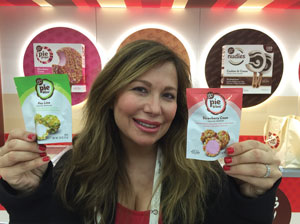
Five years ago, Jennifer Constantine was living the life as a country music singer/songwriter commuting between Nashville and Los Angeles. Then suddenly, she was stuck by a moment of serendipity when her panna cotta (an Italian custard) made for a dinner party inadvertently froze. Discovering that the result was pretty tasty, she decided to commercialize her fridge fiasco. The result was JC’s Pie Pops, a frozen novelty dessert, like a pie a la mode on a stick with a crunchy cookie crust. That was followed by Nudies, essentially a Pie Pop without the nutty crust. Pie Bites is her latest invention, a self-stable version of Pie Pops. I found it more like a mash-up between a bonbon and a Nutty Buddy, the retro nut-studded ice cream bar.
Who is her typical customer? Millennial moms with disposable income willing to buy products with quality ingredients that have an element of fun. “We call it controlled or permitted indulgence,” Constantine says. They are available in six year-round and three seasonal flavors.
What’s next on JC’s new product development pipeline? “More candy items. But, if you had asked me five years ago that I would be doing this, I would say you are crazy.”
JC’s Pie Bites – Caramel Turtle, Chocolate Silk, Mint Chocolate Cookie, S’Mores, Key Lime, and Strawberry Cream; 16-count 5.1 oz./145 gr; S.R.P. $4.59; 3-count single serve 0.95 oz./27 gr S.R.P. $1.00.
Field Trip Jerky
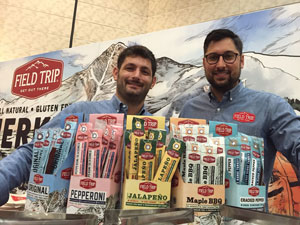
I interviewed Field Trip last year. This five-year-old company now has its jerky products in more than 30,000 stores. Co-founder Matt Levey notes that the jerky market is becoming more of a female-dominated snack; 60/40 female purchaser and 50/50 consumer.
At Expo East, the company released its new line, meat sticks, which are like Slim Jims, but way healthier, way cleaner. You know where all the ingredients are coming from, including free-range turkey, grass-fed beef, vegetarian-fed pork, antibiotic- and hormone-free.
Meat sticks are a $500- to $700-million market, says Levey. “There are not a lot of players in this market and that is why we entered it, but with a healthier option.” The line includes five flavors: Original Sea Salt Beef, Cracked Pepper Turkey, Spicy Jalapeño Beef/Pork, and a Pepperoni Beef/Pork, and Maple BBQ Pork.
Field Trip Jerky – Original Sea Salt Beef Stick, Cracked Pepper Turkey Beef Stick, Spicy Jalapeño Beef/pork Beef Stick, Pepperoni Beef/pork Beef Stick, and Maple BBQ Pork Beef Stick; 1.0 oz./ 29 gr; S.R.P. $1.79.
Thrive Tribe
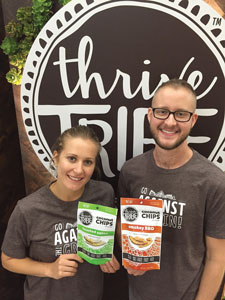
Thrive Tribe, a member of Boulder-based 1908 Brands, produces another healthy snack designed as an alternative to potato and other snack chips.
“We were looking for a quick and easy snack product; generally healthier than traditional chips, but still tasty,” says Marketing Director Craig Spalding. The company settled on coconut, a trending ingredient that is a good source of nutrients and antioxidants. Coconut is also a good vehicle for interesting flavors, whether sweet or savory.
Thrive Tribe debuted at Expo East with toasted coconut chips available in four flavors: two savory (Toasted Onion and Smoky BBQ) and two sweet (Vanilla and Original). The company’s name, 1908 Brands, refers to the year William Kent, company founder Steve Savage’s great great uncle, donated 300 acres of the last remaining redwood grove and gave it to Teddy Roosevelt. It is now known as the Muir Woods National Park.
1908 Brands – Original Coconut Chips; Smokey BBQ Coconut Chips, Vanilla Coconut Chip, and Toasted Onion Coconut Chips; 3.14 oz./89 gr; S.R.P. $4.49.
La Obamas Black Garlic

My last product review is for a trend so new that it needs a friend. La Obamas produces black garlic, which is created by fermenting for one month regular white garlic. This process caramelizes the clove and turns it black. Available as a whole bulb or paste, the end result has a sweet taste somewhat like balsamic vinegar. The Swiss company launched it at the show, with CEO Oliver La Obamas anticipating confectionery applications, especially those with an Asian-leaning flavor.
“How did I come up with this idea like this? Like many inventions in life, this came by accident. You know, you take a long shower and the best ideas come out,” says La Obama. The company is looking for a co-packer in the United States.
LaObamas contact information: +852 3960 6330
So these are 10 new healthy products that are going to make American snacks and confections if not great again, then certainly innovative and distinctive.



